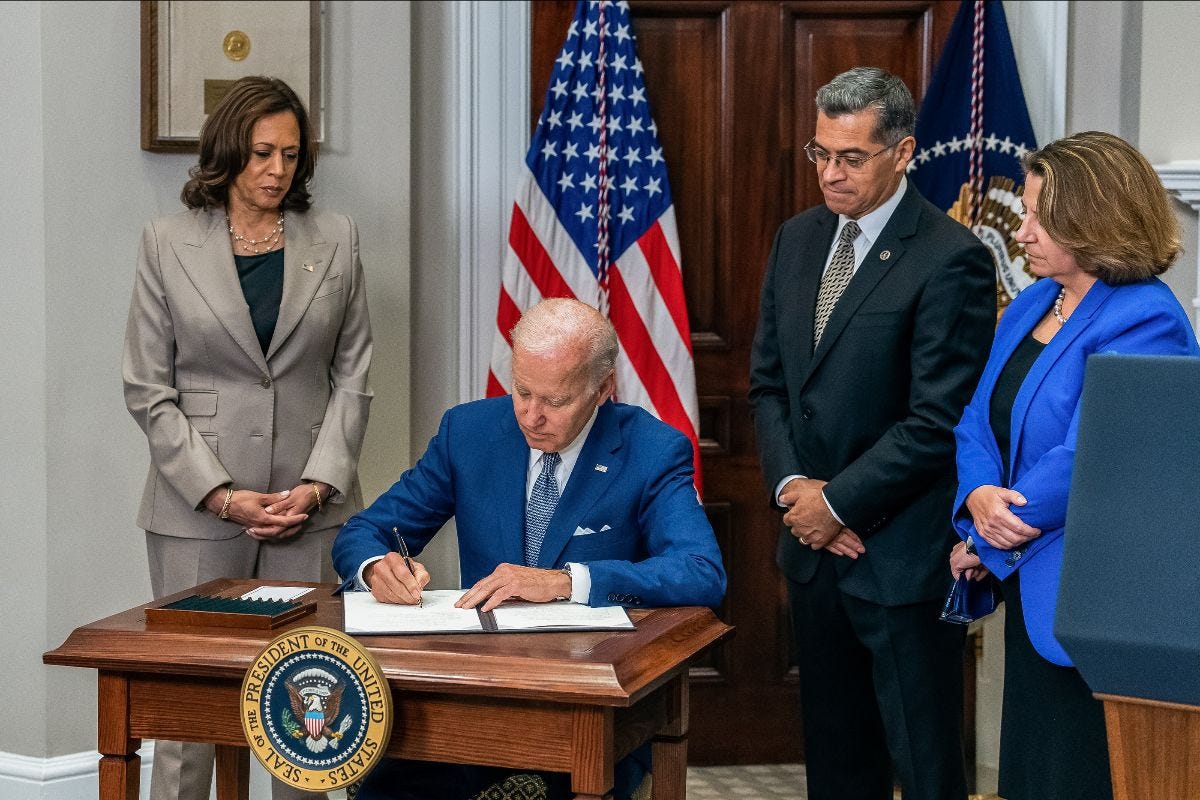Wake Up To Politics - July 12, 2022
Wake Up To Politics: Two 2022 dynamics to watch
by Gabe Fleisher
Good morning! It’s Monday, July 11, 2022. Election Day 2022 is 120 days away. Election Day 2024 is 848 days away.
Welcome back to Wake Up To Politics. I hope you had an excellent weekend.
Two 2022 dynamics to watch
As you can see above, the 2022 midterms are creeping closer: we are now less than four months away from Election Day.
This morning, I want to zero in on two key dynamics driving the midterms as they stand now — both of which speak, in some ways, to bubbling tensions between the leaders of the two parties and their activist bases:
GOP leaders vs. GOP Senate candidates
In the last 12 years, since the rise of the Tea Party movement, the Republican Party has surrendered more than its share of winnable Senate races because GOP voters nominated controversial or extreme candidates.
Names like Sharron Angle (Nevada, 2010), Christine O’Donnell (Delaware, 2010), Todd Akin (Missouri, 2012), and Richard Mourdock (Indiana, 2012) continue to haunt Republican leaders and operatives a decade or more later, representing races they could have won if not for comments on “legitimate rape” (Akin) or dabbling in witchcraft (O’Donnell).
“How could you screw this up?” Senate Minority Leader Mitch McConnell (R-KY) said earlier this year, referring to the incredibly auspicious political environment for Republicans. “It’s actually possible. And we’ve had some experience with that in the past.”
Is history repeating itself? As the Washington Post noted on Sunday, some in McConnell’s inner circle are worried it might be. Here are the recent developments that have them spooked:
In Georgia, nominee Herschel Walker faces a number of questions about his past, from allegations of domestic abuse to an exaggerated business record to three recently disclosed children. He’s also made a series of verbal missteps on all kinds of issues.
In Arizona, candidate Blake Masters’ old writings have come to the fore, in which he seems to promote anti-semitic conspiracy theories and suggest that the U.S. shouldn’t have entered World War II. Masters, endorsed by Trump, is the frontrunner in the August 2 primary.
In Missouri, candidate Eric Greitens has received criticism from within the party amid allegations of physical abuse from his ex-wife and his posting an ad that seemed to promote violence against his political opponents. Greitens, who Trump praised on Friday, is the frontrunner in the August 2 primary.
Plus, Pennsylvania nominee Mehmet Oz is facing attacks for his outsized wealth and longtime New Jersey residency, Nevada nominee Adam Laxalt recently called Roe v. Wade “a joke,” and Ohio nominee J.D. Vance compared abortion to slavery.
With control of the 50-50 Senate up for grabs, neither party has any room for error in the race for the upper chamber — which is making Republicans increasingly anxious about the candidates they’re putting forward, as new details of extreme comments or questionable backgrounds are coming to light on a regular basis.

Biden vs. Democratic activists
Republicans might be worried about the quality of their candidates, but they do have one major factor going for them: Midterm elections are generally a referendum on the incumbent president, and this incumbent president is deeply unpopular.
Just two days after running a major piece on the difficulties presented by his old age, the New York Times is out this morning with a new poll painting a bruising picture for President Biden.
Just 33% of Americans approve of his job performance in the poll, while 77% say the U.S. is “headed in the wrong direction” — more than at any point since the heights of the 2008 recession.
Biden does not just get low marks from Republicans and Independents: he’s also losing support within his own party. The poll showed that 64% of Democrats would prefer a different presidential nominee in 2024, including a striking 94% of Democrats under the age of 30.
Under the surface of rising Democratic dissatisfaction with Biden is a gulf between the president and the party’s activist class that could harm Democrats in 2022: a dispute over how to handle the end of Roe v. Wade.
Biden and other party leaders are hoping to place abortion front and center on the midterm ballot, but motivating Democrats to vote on the issue might be made difficult by swirling questions about Biden’s post-Roe strategy and his ability to enact change on the issue — even with Democratic majorities in Congress.
Biden’s team has worked hard to paper over tensions with left-wing activists for the past two years, but the abortion dispute spilled into public view this weekend with White House communications director Kate Bedingfield’s statement to the Washington Post:
“Joe Biden’s goal in responding to Dobbs is not to satisfy some activists who have been consistently out of step with the mainstream of the Democratic Party,” Bedingfield said. “It’s to deliver help to women who are in danger and assemble a broad-based coalition to defend a woman’s right to choose now, just as he assembled such a coalition to win during the 2020 campaign.”
The quote from Biden’s top flack showed how defensive the White House is growing over his response to the Supreme Court decision, as more and more Democrats go public — hardly putting up a unified front in the final months before the midterms.
Biden seemed to sing a different tune on Sunday, encouraging activists to “keep protesting” instead of bashing them like his comms chief did and signaling openness to declaring a public health emergency on abortion, which would represent yet another belated concession to activists.
Meanwhile, this morning’s Times poll did give Biden some reason for optimism: despite his rock-bottom approval ratings, the survey showed him beating Trump in a hypothetical 2024 rematch by three percentage points.
But that’s 2024. The weekend’s splash of intraparty tensions shows that Biden might not appear so strong this November without Trump on the ballot as an alternative.

What else to watch this week
January 6 hearings: The House January 6 committee is slated to hold hearings on Tuesday and Thursday, focused on the role of extremist groups in the Capitol riot and on Trump’s activists as the attack went on, respectively.
At both hearings, expect to see video clips from the panel’s closed-door interview with former White House counsel Pat Cipollone, who spoke to investigators on Friday for more than eight hours, giving testimony that committee members reported to be “valuable.”
Meanwhile, former Trump strategist Steve Bannon — facing the prospect of jail time for his refusal to cooperate with a committee subpoena — is now suggesting he’d be willing to testify before the panel.
I’ll have more on the latest January 6 news in tomorrow’s newsletter, with a full preview of the Tuesday hearing and a roundup of other related developments.
Biden in the Middle East: The president will leave Wednesday for his first visit to the Middle East since taking office, with stops planned in Israel and Saudi Arabia. Biden is already facing criticism (including from Democratic lawmakers) for the Saudi leg of the trip, which represents a marked shift in his strategy towards the Persian Gulf state.
During the 2020 campaign, Biden promised to make Saudi Arabia a “pariah” as punishment for the government’s killing of Washington Post journalist Jamal Khashoggi. Now he’s gracing Crown Prince Mohammed bin Salman — who approved Khashoggi’s murder — with a state visit.
“I know that there are many who disagree with my decision to travel to Saudi Arabia,” Biden wrote in a Washington Post op-ed published on Saturday. “My views on human rights are clear and long-standing, and fundamental freedoms are always on the agenda when I travel abroad, as they will be during this trip, just as they will be in Israel and the West Bank.”

Reconciliation talks: While Biden leaves D.C., lawmakers will be returning, as the Senate comes back today and the House tomorrow from its two-week July 4 recess.
On the Senate side, Democratic hopes are rising — not for the first time — that they might be close to a deal with Sen. Joe Manchin (D-WV) on a tax-and-spending package. Democrats hope to pass the package using the reconciliation process, which takes only a simple majority — but also takes a lot floor time, meaning this month is probably their last chance to seal and approve a deal before the midterms.
One small obstacle: Senate Majority Leader Chuck Schumer (D-NY), who has been leading the negotiations with Manchin, announced Sunday that he tested positive for Covid and will be working remotely all week. Schumer’s diagnosis could set the Manchin talks back — and also could force Senate Democrats to postpone votes scheduled for the coming days, since just one absence could throw everything off in the 50-50 chamber.
Plus: Keep an eye (as you probably already are) on gas prices. They’ve been steadily declining recently, and the national average now stands at $4.678 — still much higher than one year ago ($3.144) but noticeably down from one month ago ($5.004). The decrease in gas prices, plus Friday’s rosy jobs report, represent two positive economic indicators that have (at least temporarily) assuaged fears of a recession.
What’s going on in Washington today
All times Eastern.
— President Biden will receive his daily intelligence briefing (9 am) and deliver remarks at an event celebrating the Bipartisan Safer Communities Act, the gun control package he signed into law last month (11 am).
Later, he will receive a briefing from NASA officials to view the first images from the Webb Space Telescope, which are the highest-resolution images of the infrared universe ever captured (5 pm).
— Vice President Harris will join Biden for the gun control event (11 am) and NASA briefing (5 pm). Second Gentleman Doug Emhoff will also attend the gun control event.
— The White House press briefing will be held by press secretary Karine Jean-Pierre (3:45 pm).
— The Senate will return today after a two-week recess (3 pm). The chamber will hold a cloture vote to advance the nomination of Ashish Vazirani to be Deputy Undersecretary of Defense for Personnel and Readiness (5:30 pm).
— The House is still on recess until tomorrow. The chamber will briefly convene, however, for a short pro forma session (2:30 pm). No business is conducted during such sessions, which are held only to satisfy the chamber’s constitutional requirements of meeting every three days.
— The Supreme Court is on recess until October.
Links to watch for yourself: Biden gun control event • Biden’s NASA briefing • WH press briefing • Senate session • House pro forma
Before I go...
📚 Here’s some good news, at least for book lovers: Bookstores are making a comeback.
More than 300 new independent bookstores have opened up in the past two years, according to the New York Times, with at least 200 additional stores preparing to open.
That comes as book sales have been spiking since the pandemic: publishers sold nearly 827 million print books in 2021, a 10 percent increase from the year before.
Here’s more, via the Times.
That’s it for today. If you enjoy Wake Up To Politics, it’s always appreciated if you donate to support the newsletter or buy some merch. Or if you tell your friends and family to sign up at wakeuptopolitics.com.
If you have any questions or feedback, feel free to email me: my inbox is always open.
Thanks for waking up to politics! Have a great day.
— Gabe



